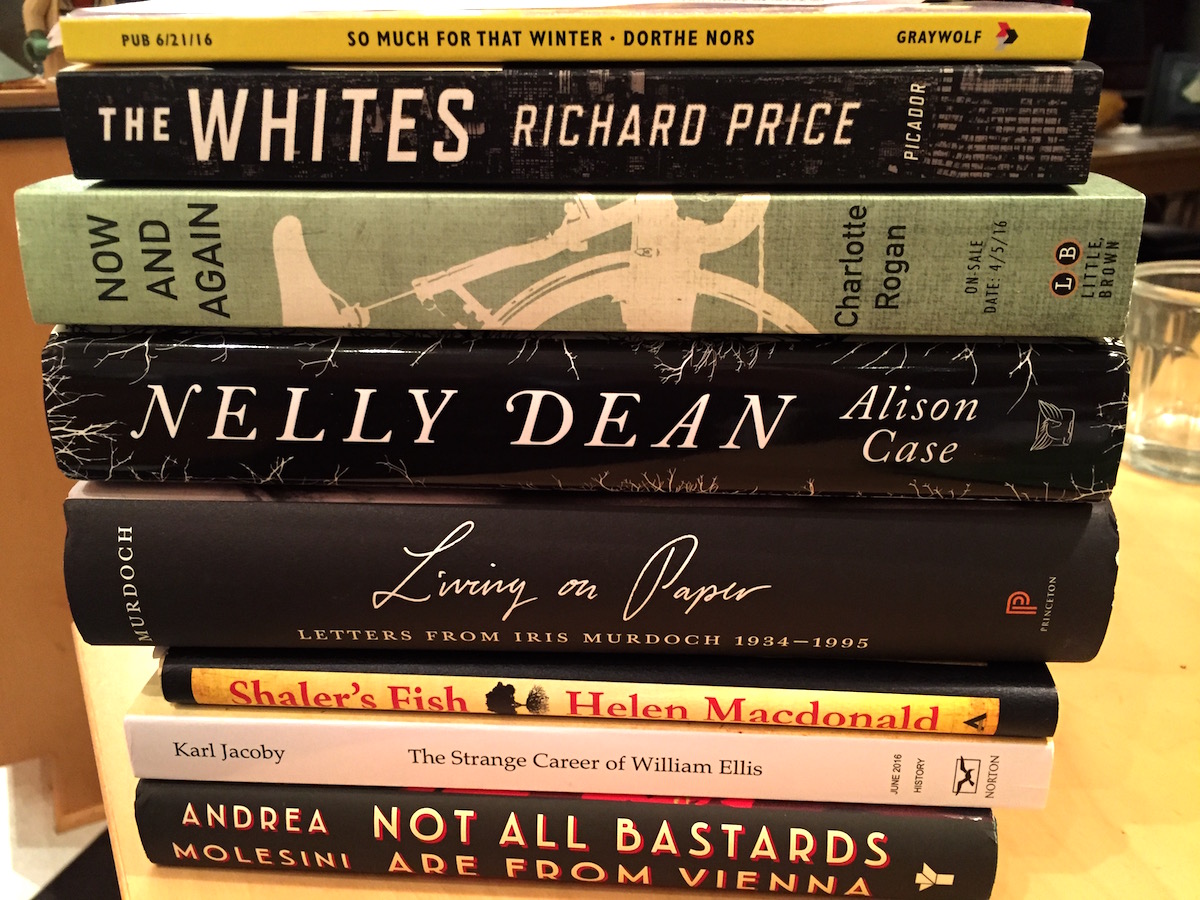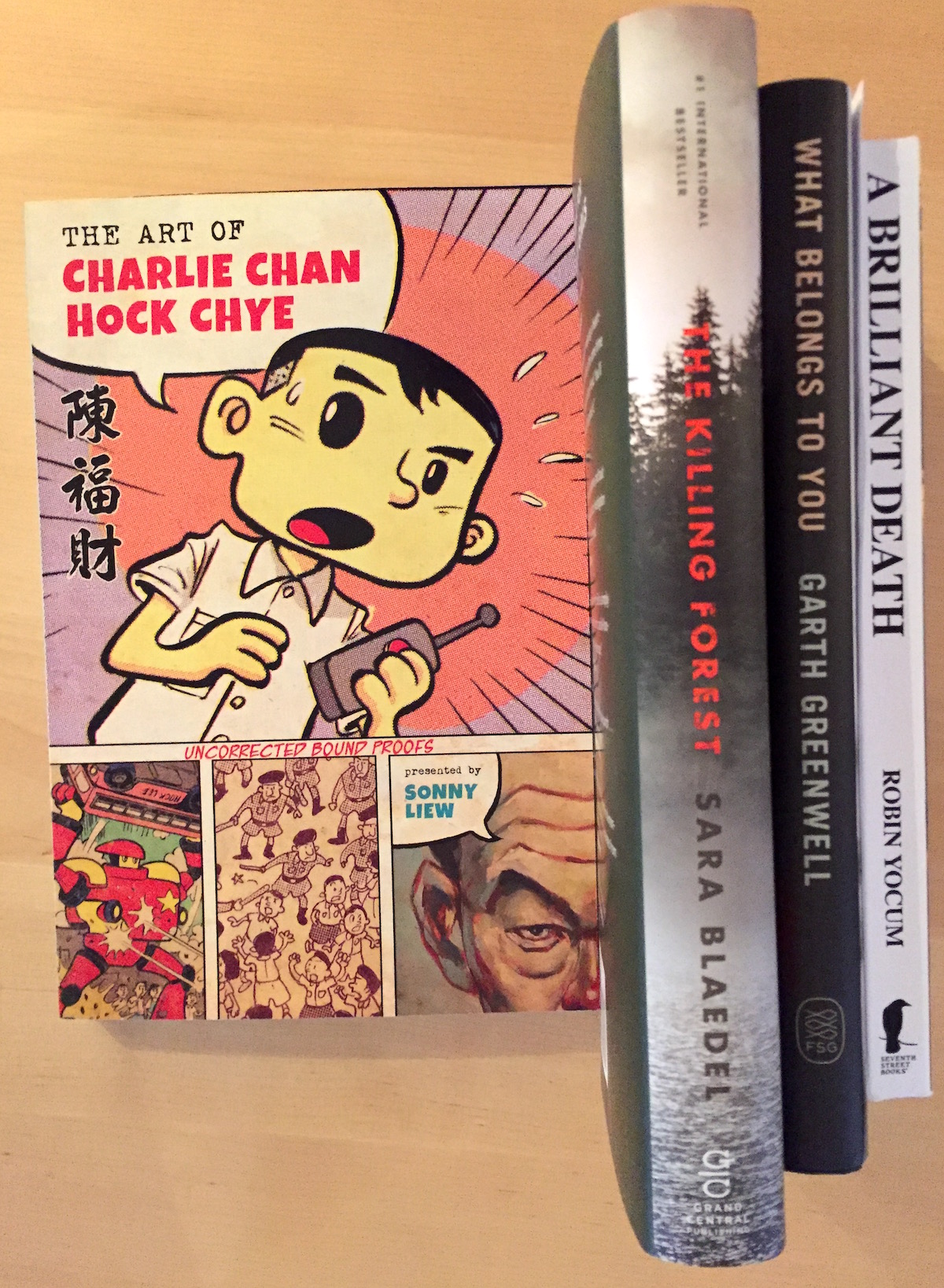Anti-censorship group "alarmed" by decision to pull A Birthday Cake for George Washington
Ron Charles at the Washington Post writes that Scholastic's decision to recall their children's book A Birthday Cake for George Washington is being protested by the National Coalition Against Censorship. (If you need a primer on the swirl around Birthday Cake, you should read Lisa Gold's excellent review, which we ran last week.)
“There are books that can — and should — generate controversy,” the organization said. “But those who value free speech as an essential human right and a necessary precondition for social change should be alarmed whenever books are removed from circulation because they are controversial.”
This is an interesting choice by the Coalition. Strictly speaking, Scholastic's decision is not "censorship." The author and illustrator of the book are more than welcome to publish the book with another press, or to self-publish it. Scholastic decided that they didn't want their name on the book. That's totally their right.
And to call the book "controversial" seriously undersells the issue. It's a historical book that misleads its readers — children — about what it was like to be a slave in the early days of America. As Gold wrote, even the author admits in the notes to the book that the supposedly happy slave she depicted ran away on Washington's birthday. Though that fact is included as an aside in the historical notes, it's nowhere to be found in the actual story. The fight against censorship is vital, but this case seems less about censorship and more about correcting a mistake.
Scholastic today released a response to the charges which tries to make that distinction:
On Monday, Scholastic replied to all fronts on this expanding battle. Saying that PEN and the NCAC “apparently did not correctly read” Scholastic’s earlier statement, the publisher sought to clarify its motives. The book was withdrawn, the publisher insists, “not in response to criticism, but entirely and purposefully because this title did not meet our publishing standards.”
Why they published Birthday Cake in the first place even though it supposedly did not meet their publishing standards, of course, is another story.
Your Week in Readings: The best literary events from January 25th - 31st
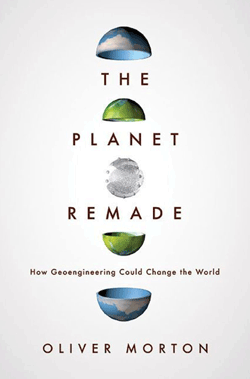
MONDAY What better way to kick off your week than a brainy talk about aspirational science? Head to Town Hall Seattle for Oliver Morton, reading from his new book, The Planet Remade: How Geoengineering Could Change the World. It’s about how “an increasing number of climate scientists are advocating for more proactive human intervention in the biosphere,” which can mean anything “from cultivating photosynthetic plankton to seeding clouds with fleets of unmanned ships.” Sounds like this could be a rare hopeful climate-related event.
TUESDAY Tonight, you’ll want to head to Elliott Bay Book Company, where Seattle-by-way-of-West-Virginia novelist Ann Pancake will celebrate the paperback release of her excellent short story collection Me and My Daddy Listen to Bob Marley with author Valerie Trueblood, who will herself be debuting a new collection of stories titled Criminals: Love Stories. Pancake is one of the top five best short-story writers in town, and she works pretty slowly, so you might not have another chance to celebrate a publication date with her for a while. Get out there and enjoy the moment while it lasts.
So that’s your Tuesday sorted, except there’s just one thing: Chop Suey is hosting an event called “A Loose Leaf Reading: An Evening Of Story Telling and Music” that looks really good, too. So I’m going to call this one a tie. This reading, like the Elliott Bay event, is free, and it features musician Nora Hughes with writers Patty Belsick, Casandra Lopez, Jenny Hayes, Kristen Millares Young, and featured reader Michelle Peñaloza. Good stuff.
WEDNESDAY This will be big fun: Seattle science fiction writers Nisi Shawl and Eileen Gunn will be reading at Cafe Racer as part of a science fiction and fantasy-themed open mic night called Two Hour Transport. I have to be honest, here. I’ve never heard of Two Hour Transport before, but it sounds like a fun time: featured readers share the stage with readers who sign up to read their sci-fi stories of five minutes’ duration or less. Gunn has won or been shortlisted for a boatload of awards. Shawl writes short fiction, publishes book reviews, and she has a novel coming out this September that we at the Seattle Review of Books are just dying to read. Maybe you’ll get a sneak preview of that book tonight.
THURSDAY Maggie Nelson reads at Hugo House. Chances are good that if you know a local writer, they have waxed rhapsodic about the idea of attending this reading. Maggie Nelson is an incredible writer (you should absolutely read Bluets and The Argonauts) and a world-class thinker. Tonight, she’ll be discussing “our different writing bodies and what they mean." There will also be a Q&A. This is the highest-profile reading of the week, and the hottest ticket in town.
FRIDAY Musician Korby Lenker reads at Elliott Bay Book Company tonight. He’s got a short story collection titled Medium Hero, which is full of all sorts of great opening lines:
- “You were my old piano teacher, and now you are dead.”
- “Come pick me up is what the text said.”
- “I was in a mood.”
- “Maybe it’s because I’m single again, maybe it’s because my dad had to go to the hospital last week for weird symptoms associated with stroke, but I’m going to write this story down.”
If you’re into short stories, you know the opening lines are half the battle. Not every story in this collection is a jaw-dropper, but they’re all energetic and exciting and eager to be read.
SATURDAY If you’re into the Seattle comics scene, your heart probably broke a little bit when you heard that Intruder, the invitation-only free local comics anthology newspaper, was going to end with issue #20. It’s so good! It’s been going for so long! We all thought Intruder would be around forever! But we still have a few issues left to appreciate, and the Intruder #18 release party is tonight at music shop Spin Cycle on Broadway, so you should go and share some of that love. This party features free comics, live DJs, and, reportedly, “a bag of kettle chips.” Does their generosity know any bounds? Apparently not.
SUNDAY The downtown branch of the Seattle Public Library is hosting something called “The Star Trek Geek Out” all weekend long. Costumes are encouraged. Today’s events include live action interpretations of classic Star Trek scenes, a screening of 2009’s Star Trek reboot movie, and a panel discussion “on Kirk, Spock and gender.” This is not strictly book-related, but come on. Us nerds gotta stick together, you know.
The Sunday Post for January 24, 2016
‘I was terribly wrong’ - writers look back at the Arab spring five years on
Eleven writers (including Laila Lalami) revisit their views of five years ago on the Arab Spring uprising.
In January 2011, days after the first uprising in Tunisia and the protests in Tahrir Square, the Guardian invited leading writers from across the Arab world to reflect on the revolutionary fervour sweeping the region. Then, they expressed great optimism for the future. Here, they revisit their responses and ask, is there still room for hope?
Erik Spiekermann
An interview, conducted by technolgy writer Om Malik, with Erik Spiekermann, a typographer and type designer whose work you, even though you don't know it, have seen many times over your life. If you saw the movie about the typeface Helvetica, called Helvetica, Spiekermann was the one telling you how much he dislikes the titular typeface. This is a great interview with a challenging and creative force of a man.
In 1985 I had the job to design a new typeface for the German post office. I went to Linotype to talk to them about digitizing my sketches, and they had a Macintosh. I had seen photographs but not held one. So I lifted it up and put the little floppy in, and then I borrowed this thing and went over from Frankfurt to Bonn, to the ministry.
I went in and told these guys, “This is typesetting & is the future. And this floppy, which I have in my shirt pocket, has the typeface on there.”
They looked at each other and went, “This guy’s gone mad.” But I knew intuitively, just like with the first smell of printed paper, that this was the future of my business.
From Pickup Artist to Pariah
For anybody fascinated by — or perhaps disgusted, freaked out, and fed up with — men publically struggling with the idea of masculinity while internetting, this is a nuanced and layered story of being caught, having regret, and maybe not really knowing what it was you got in trouble for in the first place. Will anything save us from the logical men of the internet?
Jared Rutledge has been called a sociopath. Strangers have picketed outside his coffee shop, calling for his castration. People he thought were his friends won’t return his texts. There are a few places he still feels safe: weekly lunches with his grandma, his therapist’s office, the meetings of his peer-facilitated men’s support circle. At night, he reads fantasy books and loses himself in a universe with societal rules unlike the ones he broke here in Asheville, North Carolina.
How Stories Deceive
Well, perhaps stories can save us from the logical men. Let's hope so.
In his book “Actual Minds, Possible Worlds,” Jerome Bruner, a central figure in the cognitive revolution in psychology, proposes that we can frame experience in two ways: propositional and narrative. Propositional thought hinges on logic and formality. Narrative thought is the reverse. It’s concrete, imagistic, personally convincing, and emotional. And it’s strong.
In fact, Bruner argues, narrative thinking is responsible for far more than its logical, systematic counterpart. It’s the basis of myth and history, ritual and social relations. The philosopher Karl Popper “proposed that falsifiability is the cornerstone of the scientific method,” Bruner told the American Psychological Association at their annual meeting, in Toronto, in the summer of 1984. “But believability is the hallmark of the well-formed narrative.” Even scientists construct narratives. There is no scientific method without the narrative thread that holds the whole enterprise together. Stories make things more plausible, more convincing, and more fundable. Rightly or wrongly, a research proposal with a compelling narrative arc stands out. As the economist Robert Heilbroner once confided to Bruner, “When an economic theory fails to work easily, we begin telling stories about the Japanese imports.” When a fact is plausible, we still need to test it. When a story is plausible, we often assume it’s true.
Making Room for Good Trouble - Kickstarter Fund Project #3
Every week, the Seattle Review of Books backs a Kickstarter, and writes up why we picked that particular project. Read more about the project here. Suggest a project by writing to kickstarter at this domain, or by using our contact form.
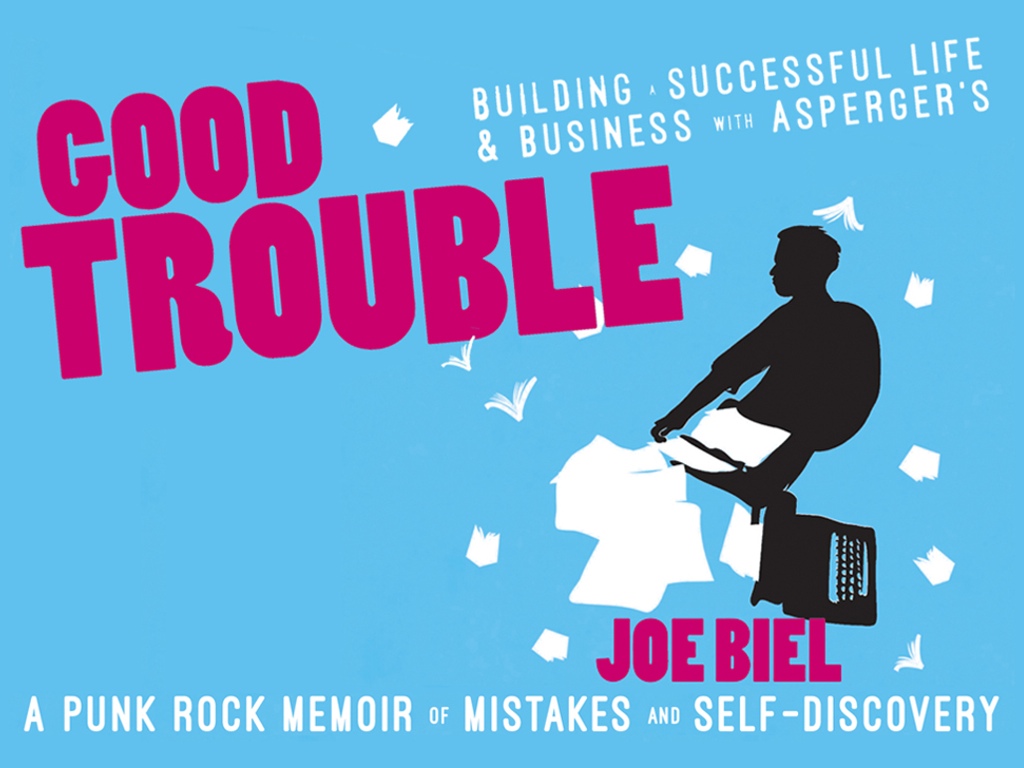
What's the project this week?
Making Room for Good Trouble. We've put $20 in as a non-reward backer
Who is the Creator?
What do they have to say about the project?
Microcosm is an independent, punk-inspired book publisher. We're about to turn 20. This is our story.
What caught your eye?
We love seeing indie publishers, especially ones as long-lived as Microcosm — they started in 1996 as a record label and distributer — and especially ones in the Pacific Northwest — they're based in Portland. After twenty some years, they have published over 350 books, have nearly three million books in print, and are still going strong.
So why throw a Kickstarter? Well, their founder Joe Biel wrote a book about his experience in publishing, and it's coming out soon. They're trying to clear space in their warehouse, so the Kickstarter is about selling backstock to make room.
So the rewards are all about getting you some books. In fact, in one of the best deals on Kickstarter, if you back for $50 you get a signed copy of Joe's new book Good Trouble, plus 24 more books. Whoa. That's an average price of $1.90 each. Total score — there's some great stuff in there.
Why should I back it?
Get the 24 pack! But also, you have to love Microcosm's message. On their website they say "Microcosm Publishing empowers readers to make positive changes in their lives and in the world around them. Microcosm emphasizes skill-building, showing hidden histories, and fostering creativity through challenging conventional publishing wisdom with books and bookettes about DIY skills, food, gender, self-care, social justice, and art."
And 50% of the books they publish are by women. Yes!
How's the project doing?
5 days to go, and they've more than doubled their goal of $3,000, so they're gonna make it. Just get in on this for the 24 book deal. Seriously!
Do they have a video?
Kickstarter Fund Stats
- Projects backed: 3
- Funds pledged: $60
- Funds collected: $0
- Unsuccessful pledges: 0
- Fund balance: $980
Sponsorships through July now open
We’ve just released our next block of sponsorships, from February-July. A week of sponsoring the site is $150, currently. You get a prominent mention on each page, and a mention in our social media the Monday your sponsorship goes up, and also on Saturday, a day before it goes down.
Our sponsors are the best — local poets, writers, and events across all genres. Our sponsors allow us to pay poets and writers to bring you the content you see here every day. In return, they get exposure to the most passionate reading audience we’ve ever seen.
You can sign up on our Sponsor page, or feel free to email sponsorships at seattlereviewofbooks.com if you have any questions. We’d love to talk to you about how we can get your work in front of our readers.
The Help Desk: A favorite author let me down. Should I stop meeting writers I love?
Every Friday, Cienna Madrid offers solutions to life’s most vexing literary problems. Do you need a book recommendation to send your worst cousin on her birthday? Is it okay to read erotica on public transit? Cienna can help. Send your questions to advice@seattlereviewofbooks.com.
Dear Cienna,
Once, I met an author I loved and it was a total letdown. She was narcissistic and bored by all the people who came out to hear her read, and I disliked her so much it made my skin crawl. Now I can't enjoy her books because it reminds me of how unpleasant she was. Should I bother going to readings anymore? I don't want to lose any more favorite authors, and the risk of them being jerks is scaring me away.
Mary, Bainbridge Island
Dear Mary,
Once, I was invited to a fancy literary party full of very impressive people – best-selling authors, sitcom writers, actors, comedians. I couldn't throw a fork without hitting someone whose work I admired. As parties go, it was normal: People sipped champagne, talked child rearing, traded jokes and were surprisingly tolerant of me sweating on them. I should say, it was normal except for me. Intimidation, my natural dearth of social graces and a near-painful desire to make a good impression rendered me mute – that is, until the hosts' daughter, a sweet-looking girl of about 12, emerged from the kitchen with a plate of fresh-baked chocolate chip cookies and began offering them to guests.
“Mmmm, is there anything better than a cute little girl handing out warm cookies?” One actor asked rhetorically.
That is the moment I found my voice. “Only if she's stripping,” I said.
The actor stared. The child proferred her plate to me with pity in her sweet brown eyes. There was a moment of silence as everyone in the room wished my place were filled by someone who could pass the very low bar of not sexualizing children in casual conversation. That was the day Paul Constant learned that bringing me as his date to parties is like reading Proust to a pig.
I bring up this story, Mary, to illustrate how awful some writers are at interacting with other people. Others are just awful in general (Norman Mailer was a notorious misogynist who once told a crowd of fans that “a little bit of rape is good for the man's soul.”). Either way, you have to separate the person from his or her work and be generous enough to pity them when they act like dicks in public, as all those people pitied me years ago.
Because by their nature, books are a private obsession, both for writers and readers. So attending an author's reading is, to me, an unparalleled act of public intimacy that can go horribly wrong or beautifully right. Personally, I think it's worth wading through a few assholes to experience the beauty.
xoxo,
Cienna
Book News Roundup: Amazon finds a new way to screw over authors
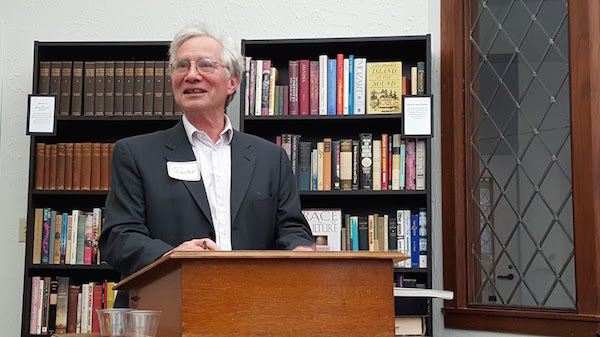
The Seattle Weekly's Mark Baumgarten talks with David Brewster about his Seattle atheneum, Folio. I wrote about Folio last fall, and it's now open to the public. If you're wondering whether a paid library/coworking space is right for you, you should drop by and take a look. It's on Marion Street, between 3rd Ave and 4th Ave downtown.
VIDA updated their excellent list of presses run by women this week. Women still don't possess an equal share of high-profile positions in the pubishing industry; supporting these presses is a way to help correct that imbalance.
The people behind popular narrative horror/comedy podcast Welcome to Night Vale are branching out by launching a podcasting platform, reports the New York Times. They hope to experiment with longform serialized fiction podcasts, which sounds like a great idea.
Newspapers are dying. No, really.
Graphic novel sales in bookstores increased by 22 percent last year.
We've been hearing from a lot of self-published authors who are upset with Amazon lately. Author A.M. Madden has published an open letter to Amazon on her blog that lists the majority of these complaints: basically, Amazon keeps changing the rules on their self-published authors. These changes result in huge financial losses for the writers, who are locked into Amazon's ecosystem and are, therefore basically powerless. "My fans have increased, and I now have nine books published instead of just three, yet in 2015, I made less than half in royalties that I made in 2014," Madden writes. Go read the whole letter.
University Book Store warns of sales impact from Amazon Books
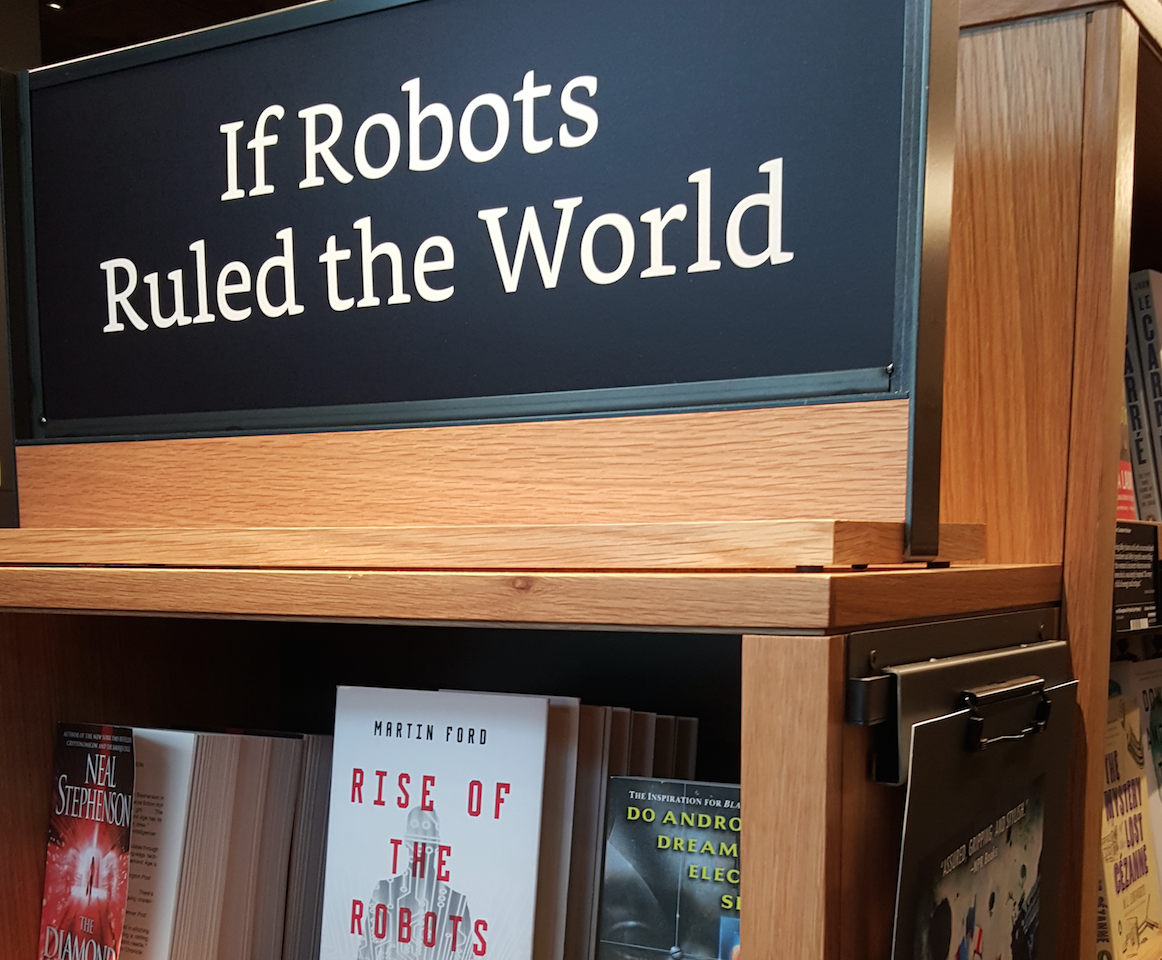
University Book Store manager Pam Cady is quoted extensively in a piece by Julia Carrie Wong in the Guardian today. Cady says Amazon's brick-and-mortar store is having a serious effect on U Book Store's sales:
“Everyone’s had to adjust to Amazon online,” she says, “but having a store just down the street is a little different. We’re at ground zero. We’re in the blast.” University Book Store is less than a mile away from Amazon Books.
Cady wouldn’t provide specific numbers on how Amazon Books has affected University Book Store’s sales, but she says that she’s definitely noticed “different spending patterns”.
“It scares me what could happen not just to us, but to everyone,” Cady said.
A hopeful side of me believes that this rush to Amazon Books is a fad, a novelty. A slightly more cynical side of me believes that the customers you'd find in Amazon Books are not the same customers you'd find at one of Seattle's many independent bookstores.
But if you do visit Amazon Books to check out how an algorithmically obsessed bookstore works, the Seattle Review of Books would like to gently remind you to reverse-showroom the hell out of the store: browse at Amazon Books all you want, but please buy the books from an independent bookstore. Our local bookstores bring authors to town for free readings; they carry a stock many multiples larger than what is carried at Amazon Books; and they encourage a broader, more exciting browsing experience bolstered by tons of recommendations from the humans who work there. We believe this is something of value, something that should be supported.
Portrait Gallery: Raul Alvarez
Each week, Christine Marie Larsen creates a portrait of a new author for us. Have any favorites you’d love to see immortalized? Let us know
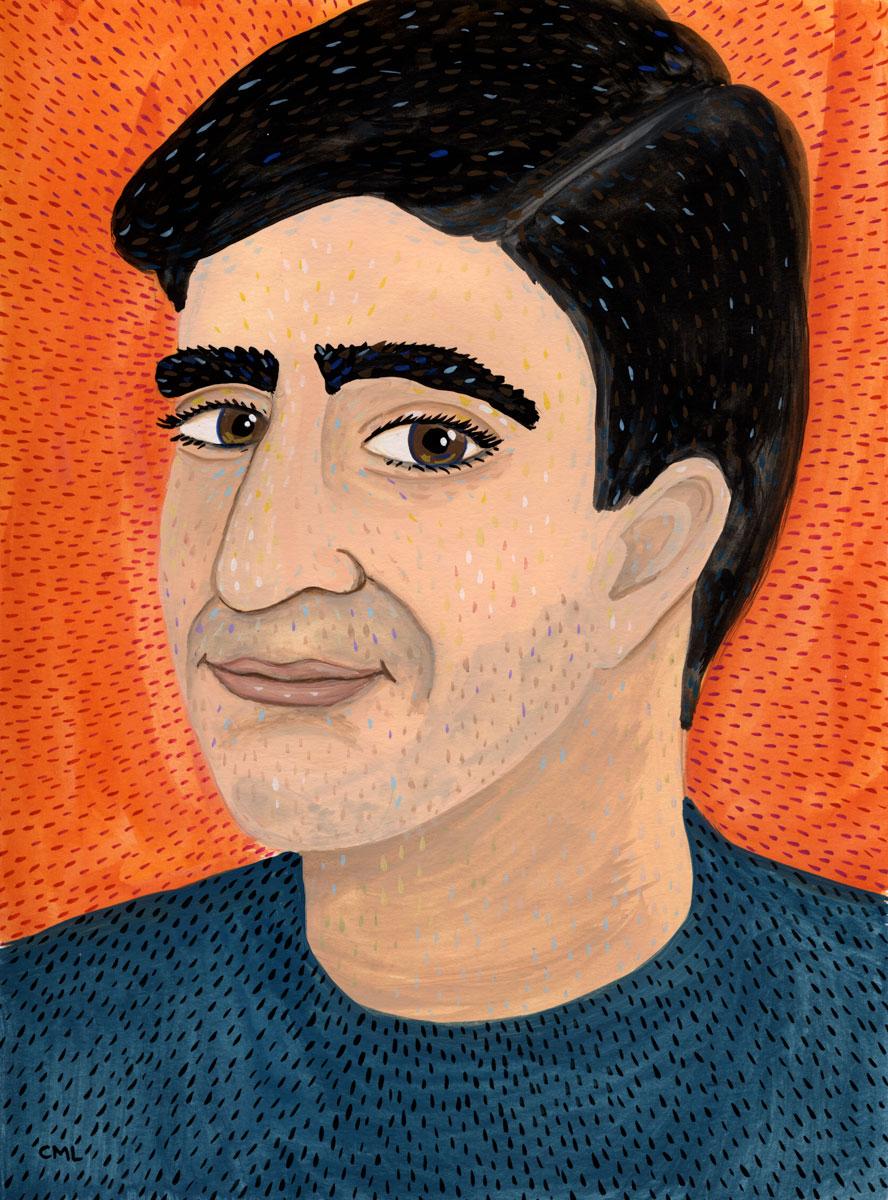
Poet Raul Alvarez reads, with Julie Carr and Diana Khoi Nguyen, this Sunday at Fred Wildlife Refuge.
What a lovely way to burn
Published January 21, 2016, at 11:56am
A Finnish novel about a dystopian gender-centric society and an underground economy built around hot peppers offers a solution to the problem with apocalyptic fiction. Rather than ripping off the Hunger Games, authors, why not try to be original for a change?
Thursday Comics Hangover: Sometimes no context is context enough
Recently, I visited a comic book store with a friend. She reads all kinds of graphic novels and collected comics, but she’d never spent more than a few minutes in a comic shop. Immediately, it became clear that for people who haven’t spent their whole lives in comic shops, there’s a bit of a learning curve to browsing. She picked up a comic and turned it over, looking for an explanatory blurb, like the one you find on collected comics. Of course, there are no blurbs on monthly comics. Aside from the cover image, there’s no indication at all what the comic is about.
Finally, frustrated, she asked me, “so how are you supposed to know what the comics are about?”
It was a great point. I explained that you could flip through the comic and see if you were interested, but mostly hardcore comic shop customers browse through a catalog months in advance, read promotional copy about upcoming comics, and order their comics based on that. It had never struck me exactly how weird this system is. Can you imagine what it would look like if bookstores — or, really, any other kind of art at all — relied on the same business model?
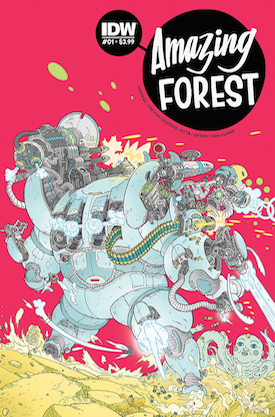
But that’s really all I know: are the stories supposed to be thematically linked? Two of them are weird science stories and two fall within disparate subgenres of fantasy. Reading Amazing Forest was a strangely unmooring experience, because I wasn’t sure if the stories were one-shots or the first installment in serial stories. (In retrospect, I’m pretty sure they’re all self-contained.) Only after I’d read the thing twice through did I begin to have a sense of what the comic was.
Amazing Forest is a Twilight Zone-style comic, which is to say each of the stories focuses on genre, and they generally feature a twist of some kind. Some of the stories are more engrossing than others. The first story, “Tank” — about a crew of men in a futuristic tank who have to battle victims of a plague who bear an eerie resemblance to long-lost loved ones — is good but a little too high-concept for eight pages. The twist in the second story, “Wolf Mother,” left me cold. “Ronnie the Robot” is an old-fashioned EC Comics-style riff, complete with a hoary climax that is pretty obvious, but which still feels satisfying. And the last story, “Bird Watcher,” ventures into weird literary fiction; a nuanced, creepy story, it’s by far the best of the bunch.
In the end, I don’t think I could really tell you what Amazing Forest is supposed to be. It’s kind of an anthology, except they’re all written by the same two people. It’s a short story collection, but the breadth and range of genres give the comic more of a wide-ranging feel and less of a thematic cohesion. That unmooring I mentioned before is not so much a bug as a feature; this is a book that benefits from your inability to categorize it.
No? I don't either, but that's okay. Joanna Rothkopf at Jezebel has written a great look back at 1991, when one of our greatest living poets decided to run for president as the only "openly female" candidate. This story is great for two reasons: First, it's a great story. And second, it caused me to fall down an Eileen Myles-themed YouTube hole.
Deadline reports that Richard Morgan's sci-fi novel Altered Carbon is on track to become a Netflix series.
Altered Carbon is a cyberpunk detective thriller in the style of William Gibson about digital immortality in a world 500 years from now. It's a spectacular, fun novel and you should give it a try. Adaptations are a fine thing — Netflix has a pretty good track record when it comes to their programming — but a year from now, when everybody is talking about Altered Carbon, you're going to want to read the original. Read it now so you're ahead of the curve and so that you don't have to buy the crappy tie-in cover with a photo of TV stars and a Netflix logo plastered on the front of the book. You've been warned.
Push/Pull gives a home to artists who feel underrepresented

Maxx Follis originally created the space that would become Push/Pull at Echo Echo, a collective gallery in Greenwood. She always intended for Push/Pull to be a cooperative space with artists acting as members, but her first call for members only delivered one artist — cartoonist Seth Goodkind. “So when it started out it was just the two of us trying to fill four walls of art” every month or so for a new show, she explains.
Soon, Follis and Goodkind realized that they needed to build a community if they wanted their gallery to take off, because “we couldn’t just make art all the time.” She pauses and corrects herself. “We couldn’t make good art all the time. You can make art all the time,” she says, but if all you’re doing is running on a treadmill, you begin to sacrifice quality at the altar of quantity.
After a long search for space and a successful Kickstarter, Push/Pull opened two months ago in their new home at 5484 Shilshole Ave NW with seven contributing artists as members. (“I’m almost done sending out all of the [Kickstarter] rewards,” Follis tells me. How was crowdfunding for her? “It was totally crazy and I wouldn’t recommend it to, really, anyone, but I definitely think I would do it again.”) Over the course of the space’s development, Follis says, “comics became one of our main focuses.”
Push/Pull is much more illustration-centric than most of the galleries in town, which focus more on so-called “fine art.” Follis says there’s a definite prejudice in the art world against illustration; “fine artists don’t realize how much work goes into drawing,” she says.
And now as illustrators come to Push/Pull events and start to hang out with cartoonists, Follis says, the lines between those disciplines are blurring. “It’s funny how many [illustrators] don’t do comics and then they start to hang around with these cartoonists and all of a sudden they’ll come out with a mini[comic].” She says people who have only drawn static illustrations are starting to think to themselves: “I can do something more than just make a piece. I can create a story.”
The work ethic of cartooning plays right into Push/Pull’s aesthetic theory of abundance. “The reason that the artist/illustrator/cartoonist tends to be a good fit for us,” Follis says, “is that people who do comics are compelled to tell stories, so they already have a drive and they tend to work well for us because they want to make art all the time.”
All of the art and comics at Push/Pull are sold on commission, and Follis claims that they offer some of the best rates in town — the artists keep 75 percent of sales. Push/Pull pays regularly, too, which leaves some cartoonists in a state of shock. They’re treating artists who generally don’t enjoy a whole lot of respect as professionals who are worthy of attention.
“We have artists that specifically come to us because no other gallery in Seattle will show them,” Follis says. “And we like that.”
According to ThinkProgress, Ursula K. Le Guin wrote an angry letter to the Oregonian in response to what she perceived as a pro-militia front page article.
Ammon Bundy and his bullyboys aren’t trying to free federal lands, but to hold them hostage. I can’t go to the Malheur refuge now, though as a citizen of the United States, I own it and have the freedom of it. That’s what public land is: land that belongs to the public — me, you, every law-abiding American. The people it doesn’t belong to and who don’t belong there are those who grabbed it by force of arms, flaunting their contempt for the local citizens.
You had plenty of reasons to love Ursula K. Le Guin. Here's another one.
This year's Philip K. Dick Awards shortlist was released last week:
EDGE OF DARK by Brenda Cooper (Pyr)
AFTER THE SAUCERS LANDED by Douglas Lain (Night Shade Books)
(R)EVOLUTION by PJ Manney (47North)
APEX by Ramez Naam (Angry Robot Books)
WINDSWEPT by Adam Rakunas (Angry Robot Books)
ARCHANGEL by Marguerite Reed (Arche Press)
On that list, Brenda Cooper lives in Kirkland, Ramez Naam is a Seattle author, and Adam Rakunas moved to Seattle last year. (Read my review of Windswept here.) This is a pretty strong showing for local sci-fi. It's especially heartening that it's the Dick Awards, too, because they are, in my opinion, the best of the science fiction awards, favoring substance over style.
The winner of the Philip K. Dick Award will be announced at Norwescon in SeaTac on Friday, March 25th. Here's hoping a local author brings it home.
Karma's a Killer book release party
This Saturday, sponsor Tracy Weber is throwing a release party for the third book in the Downward Dog Mystery series, and she'd love it if you came by. The new book, Karma's a Killer, follows heroine and Seattle yoga instructor Kate Davidson and her onery German shepherd Bella, as they encounter yet another impossible situation that only Kate can solve.
Read a full chapter from Karma's a Killer on our sponsors page, and make sure to mark your calendar for this Saturday January 23rd, from 2:30-4:00pm, and join Tracy at Whole Life Yoga on Greenwood.
Because of sponsors like Tracy, we have the money to pay for the content you see here every day. All we ask is that you read a free chapter from her book, and if you like it, considering picking up a copy of her book, or dropping by her party. It's all part of our campaign to make internet advertising 100 percent less terrible.
Congratulations to Seattle author Elissa Washuta, who announced today that she's becoming the Saturday editor of popular website The Rumpus. She's looking for pitches; send her your best stuff.
